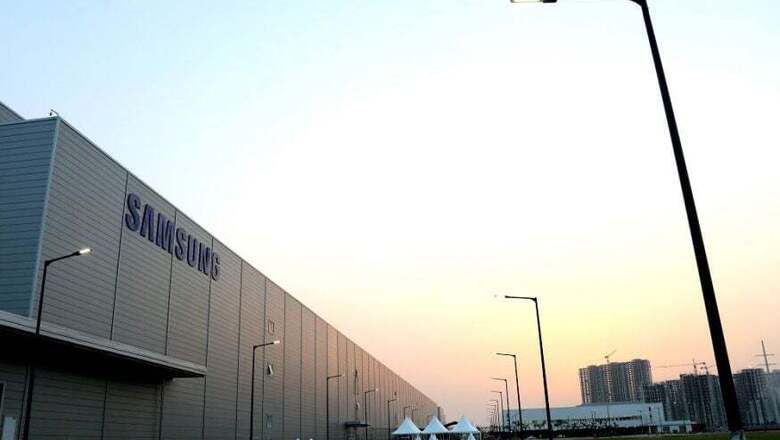
views
Samsung Electronics Co is counting on a gradual recovery in memory chip demand from data centers and 5G smartphone makers to help it bounce back in 2020 after sliding to its worst operating profit in four years. But in a guarded outlook, the world’s biggest memory chip and smartphone maker said on Thursday it couldn’t rule out the possibility that demand growth may be curbed amid lingering tensions on U.S.-China trade and looming fears of the economic impact of the new coronavirus outbreak in China and beyond.
The conservative forecast failed to satisfy investors hoping for a brighter outlook, and the company’s shares ended down 3.2%, having fallen as much as 3.9% at one point, while the Seoul market benchmark was off 1.7%. Samsung, which counts smartphone rivals Apple Inc and Huawei Technologies Co as customers for its chips and displays, said fourth-quarter operating profit slumped to 7.16 trillion won ($6.13 billion) on weaker chip demand, down 34% from the same period a year earlier. That was in line with its own estimate, though net profit for the quarter skidded 38% to 5.2 trillion won, meaning Samsung missed analysts’ estimate of 5.6 trillion won.
The October-December quarter marks the end of a year marred by bloated stockpiles of chips that squeezed prices, and the U.S.-China trade war that roiled global supply chains and prospects for consumer demand. For the year, the South Korean conglomerate posted operating profit of 27.8 trillion won, its lowest since 2015. Samsung said it also expected January-March earnings to fall from the preceding quarter, reflecting low seasonal demand for chips and displays. Speaking during a conference call, a Samsung chip executive flagged uncertainties in chip demand.
“The macroeconomic and geopolitical concerns are showing signs of easing recently, but we can’t rule out the possibility that the situation would deteriorate,” said Han Jin-man, senior vice president at Samsung’s semiconductor business unit. He didn’t identify specific issues that could affect the company.
Virus outbreak
In contrast with Samsung’s modest forecast, chip peers like Intel Corp and TSMC earlier offered positive outlooks, fuelling hopes of a rebound in chip prices after a slide that started in late 2018. “Samsung offered a conservative outlook for the memory market, and there is a disconnect between market views and the company views when it comes to strength of the recovery,” said Park Sung-soon, an analyst at Cape Investment & Securities. Meanwhile, after posting strong results, Apple earlier this week flagged uncertainty created by the coronavirus outbreak in China which economists fear could hurt the global economy.
On Thursday Samsung Electronics, which has chip, display and home appliance plants in China, declined to comment on the impact of the outbreak on demand. In a statement to Reuters, it said it had extended a holiday closure for some factories in line with Chinese government guidance. But supplier Samsung SDI, which makes phone batteries and materials for chips and displays, said it expects current-quarter earnings to be adversely affected by the virus outbreak. Fourth-quarter operating profit more than halved to 3.45 trillion won in Samsung’s mainstay chip division, while its mobile division profit surged by two-thirds to 2.52 trillion won, thanks to strong sales of flagship models and a revamp of its mid- and lower-end A series line-up.
Samsung said the actual pace of 5G network expansion and its effects on memory demand remains to be seen, although the company sees demand picking up around mass-market 5G models. It said it aims to expand its presence in the 5G network equipment market in the United States, while continuing to look at the possibility of entering the European market. This week Britain granted Huawei a limited role in developing the country’s 5G mobile network, frustrating a global attempt by the United States to exclude the Chinese telecoms giant from the West’s next-generation communications.




















Comments
0 comment